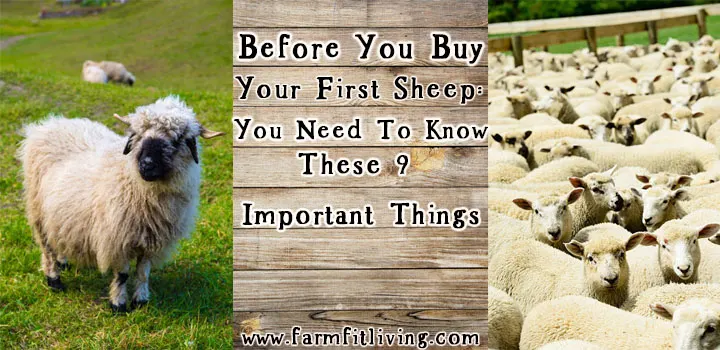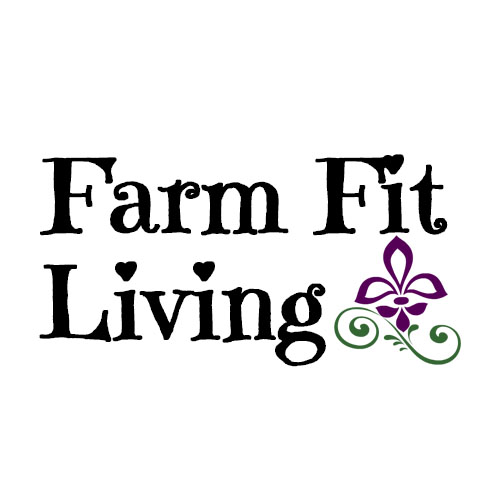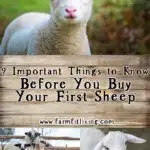Before you buy your first sheep, you need to read about these 9 important things.
It’s so important to know these things before you buy your first sheep. I emphasize the word BEFORE. You want to be prepared.
I asked my four-year-old what I should include in this post. She said sheep need fence and food. Yes! She’s got it.
But, there’s a few more things you need to know. It’s best to know and learn all you can before your sheep comes to your place.
In this post, I’ll share:
– 9 important things to know before you buy your first sheep,
– The best questions to ask about starting a flock of sheep,
– Pros and cons of raising sheep.
Listen to the Podcast Episode:
This post is going to help you prepare to get your new sheep before you get thrown in. Let’s dive in.
This post contains Affiliate Links. This means if you click and buy, I might make a commission at no cost to you.
See my policy for more information

1. What are your goals with your sheep?
There’s so many different breeds and types and purposes of sheep. You need to set some goals and boundaries to stick to first so that you will buy the right sheep for you.
If you don’t have goals or boundaries, you could end up with just a hodge podge group of sheep that don’t work for what you want to do.
I suggest making some goals related to:
– Wool or Hair Sheep?
– How much do you want to spend? What is your budget for sheep?
– Do you care about registration papers?
– Do you want to start with bred ewes or open ewes?
– Where do you see your flock in the future?
– Low Maintenance Sheep vs. High Maintenance Sheep.
– Research some quality breeders or places to buy sheep.
Those are just some goals to get you started. Don’t think too long on this because you could be brainstorming and thinking on it forever. Be sure to take some action. Here’s a good place to start.
2. Start With Great Breeds & Genetics
After you have made a few goals to start with, start with choosing the breed you want. As I said, there’s LOTS of breeds out in the world and you need to decide which breeds work for what you want to do.
Also, know that there’s different TYPES of sheep. There’s wool sheep, fiber sheep and hair sheep. Go here to read about the breed of sheep I have been raising for nearly a decade.
Once you’ve made a decision about which type and breed you’ll get, figure out where you will get them. Will you go to the sale barn or a breeder to buy your first sheep?
You want to buy the best quality breeding stock you can afford from the beginning. Know where the sheep came from. I recommend finding a reputable shepherd or breeder who manages their flock the same way you would raise your own.
Here’s some hints:
- If you want to have sheep that will graze out on range, it’s probably best to visit that type of place.
- If you want show stock, visit a breeder well known for breeding high quality show stock genetics.
Visiting other farms will allow you to make connections and meet people within the industry. From there, you can make your decision on what you want to get and even make a contact of a good breeder to buy your first sheep from.
More Answers to Questions about Breeding Stock
You might be toying with the idea of buying younger sheep if the price is right or older sheep who are already hardy. Here’s what I recommend:
If you’re brand new to sheep, buy older ewes that are already bred. That way you won’t need to deal with a ram until the next year. I’ll talk more about this in the ‘Sheep Behavior’ section.
Also, if you want fiber sheep, know that not all fiber is of equal quality. Again, buy from a reputable breeder and be very careful.
Finally, start small. Start with just a few to help get you started that you can grow from. Some of the top cattle breeders in the country that I know started out with one or two head of cows. Be sure to find the best you can that matches your goals to start your flock. Growing in size is the easy part but finding the quality you want can be very difficult.
3. Equipment
The next thing you need to know before you buy your first sheep is what equipment you need. You can’t just buy sheep and not be prepared. Sheep need shelter, fencing and veterinary supplies.
Let’s talk about fencing first. It’s really pretty easy to do because sheep are not like goats. I’ve had really good luck keeping them confined into an electric fence but we mainly use woven wire fence like this in their permanent pastures.
Woven wire fence is expensive but it will last a very long time with sheep. We also put a strand of barbed wire above the woven wire to keep out any predators.
A place to get out of the weather is also needed. Sometimes, this can be as simple as a thicket of trees or a cave. But other times you need to make them a shelter to protect them from the elements.
The type of shelter doesn’t matter much
But it needs to do its job of protecting your sheep. A Winter lambing barn should be warmer than a summer rain shelter. It should serve it’s purpose well enough.
Along with the shelter, a good shepherd needs to build catch pens and a chute system to work the sheep. The working system doesn’t have to be elaborate and can be built with whatever you have. Sometimes, we just scrape together whatever gates we can make in our alley way for a catch pen to sort the sheep.
It’s really not rocket science and you don’t NEED a lot of equipment for sheep. Really, you need fencing, shelter and a way to catch them. You need a good place for deworming, vaccinating, sorting and weighing if needed. But, it’s also a good idea to have some vet supplies on hand in case of emergency. I’ll talk more about this in the ‘Vet Section’ of this post.
Here’s a short list of supplies to keep on hand for sheep:
- Prolapse Retainer
- Cast with vet wrap
- Vetericyn
- Digital Thermometer
- Towels
- Blood Stop
- Blue Cote
- Antibiotic
- Bloat Treatment
- B Complex
- Selenium E Paste
- CMPK Gel
- Bungee Cords
- Wire
- Wire Cutters
- Bolt Cutters
- Crowbar
- Rope
Also, if you get wool sheep, you need to keep shearing in mind. You can hire a shearer to come shear your sheep. A shearer needs to be lined up 6 months in advance.
If you want to shear your sheep yourself, find a good mentor to help you learn. This mentor can also help you learn about sheep care and nutrition.
4. The Right Nutrition
For any living thing, nutrition is critical to the health and wellness of your sheep. If you want your sheep to perform, they need to have proper nutrition every day. It’s the number one limiting factor in all herds.
The first thing you should know is that the sheep’s needs change all the time and depend on the amount of work of the sheep. For example, ewes who are in milk and nursing their babies need more protein and energy than ewes who are open. Rams who are working need more energy than rams who aren’t.
Growing kids need plenty of energy to help them grow.
In a nut shell, match your phase of nutrition with their phase of production.
With this in mind, though, you don’t want to give sheep what they DON’T need. Fat sheep have trouble lambing and even getting pregnant. But, skinny sheep clearly need extra calories and need to be checked for worms.
Sheep need minerals, water, energy, protein and roughage every day. We provide our sheep with Purina loose sheep mineral as well as a sheep feed when they are lambing and nursing babies. All the rest of the year, they are on grass and salt. Our sheep do very well with this rotation.
If you don’t have good nutrition for your sheep herd, you don’t have anything. Again, match your nutrition to the phase of production your sheep are in. Keep in mind not all sheep might be in the same production stage. That’s why it’s important to have good facilities so that you can separate them, too.
Finally, keep in mind that sheep can’t have anything with copper in it. Too much copper overload will kill them over time. Stick with feed and minerals labeled for sheep. If you’re grazing sheep with other animals, stick with free-choice salt. Be sure to keep plenty of water on hand for them, too.
5. Understand Sheep Health
Nutrition and health go hand in hand. If you feed your flock well, you likely won’t have a lot of health issues to deal with.
However, it’s a good idea to still be aware of health problems that could affect your sheep and prepare for them. After 10+ years of raising sheep, I can honestly tell you that you can’t be too prepared when it comes to the health of your sheep.
When we do health checks in our sheep flock, it’s mainly checking for worms, physical body condition, foot rot or injury and other ailments.
For worms, we prefer to FAMACHA check our ewes and then take fecal samples to our vet. If you don’t have a vet you work with, you can get your own fecal testing kit here.
I strongly suggest a good relationship with a vet.
In most cases, vet care can be done by the shepherd. But, there are a few cases that could happen that’s beyond your knowledge and control. If you don’t have a vet near by, maybe you have a friend or a mentor who can come help you.
Please know that you can’t learn too much about health care in sheep. You can learn as you go and hopefully, I’ve helped you to get started. You know your sheep and know if something isn’t right. Just trust yourself.
One thing to note about health
If a vet is not available and you don’t know how to help your sheep, you can Google Search the symptoms your sheep may have. From here, you’ll find articles about the symptoms and maybe even how to treat for those symptoms.
If you still aren’t sure, reach out to a Facebook group or forum to ask for clarification. At this point, you have a little knowledge to work with from your first research point. There’s lots of knowledgeable sheep owners willing to help you. This is why mentorship is super important.
Again, having a vet is always the best option. However, a vet is not always available and you can learn as you go with the help of others.
6. Understanding Sheep Behavior
Sheep are pretty simple creatures. Much of their behavior depends on their breed and type.
For example, my hair sheep are fairly skittish when out on pasture. They keep their distance from me when I go out to visit them. However, when I have them in the lambing pen and they get feed, they run up to me and want to be petted and loved on.
For the most part, sheep are pretty easy to handle. Like I mentioned, if one sheep goes one way, the rest follow. They are very vulnerable creatures. They are also prey animals and they know it.
Since they are prey animals, they need protection. They need shelter and guardians to protect them. You will be the guardian of your sheep and that includes making sure they are healthy.
Get to know their personalities and do regular health checks.
Ewes are very good mothers to their babies. Read more about why you should just let the ewe lamb and not interfere if you don’t need to.
Baby lambs are quite curious. If you catch one, they will snuggle in your arms.
Finally, rams can be sweet but ornery. If you aren’t paying attention, they can live up to their name and ram you. This has happened to me and it really hurts.
In a nutshell, sheep are really pretty smart and will do what you want them to do given the proper set up. They are quite low maintenance and can pay for themselves if you watch what you spend on them.
7. You Can’t Have Just One
Sheep are social creatures. Where one sheep goes, the others follow. I always recommend getting at least two sheep when new sheep owners get started.
Plus, they are super cute. Why wouldn’t you want more than one?
8. Get a Good Vet on Speed Dial
I’ve talked about this before but I want to say it again. You need to have a good sheep vet you trust. Before you even get your first sheep, find out if there’s a good vet nearby.
If you’re lucky enough to find one, help them become familiar with your farm set up and management plan. Develop a relationship with them. Waiting to develop a good relationship with a vet who is knowledgable with sheep and your management plan is a disaster waiting to happen.
Read More About Why You Need a Good Vet Relationship Here
But what if there’s no vet nearby that it good with sheep?
If there’s no vet nearby, you might not be totally alone. There might be some other sheep owners who can act as your mentor. Find one who is a fellow shepherd that is hopefully close enough to your farm to visit with them face-to-face. Hopefully, your mentor is close enough, they can even come over and show you the ropes.
Read More on Finding a Good Mentor Here
Finally, be aware that works for a sheep owner raising one type of breed in one location doesn’t always work for someone else raising the same breed in a different locations. Nutrition of the vegetation and environment might be a lot different in these two flocks.
So, when you’re asking specific questions, keep location, breed and your flock goals in mind. Analyze the answer and use what will work best for you.
9. Books and Resources
Before you buy your first sheep, you can do some research. Here’s a short list of some good quality resources to check out before you buy your first sheep:
- Living with Sheep book by Chuck Wooster
- Managing Your Ewe and her Newborn Book by Laura Lawson
- Storey’s Guide to Raising Sheep
- Other Breeders/Mentors
- Agriculture Extension Office
- Sheep 101 Book
- OMAFRA fact sheets
- Pipestone Sheep Health
- Premier Sheep Management Wheel
Also, keeping great records on your sheep herd is really important. Find a good recording system or simply use excel to keep track. Keep track of each sheep in your flock:
- Health
- Lambs born
- Tags (Identification)
- Physical Appearance
- Anything else you want to keep track of.
The main thing to remember is to never be afraid to ask questions. Never be afraid to learn something new. You’ll always be faced with new opportunities and challenges. The main thing is to learn and grow along with your sheep.

Be Prepared to Enjoy Your Sheep
Sheep are adorable, fun and sweet creatures. You’ll have an amazing time just watching them. Then, there will be days where you will want to get rid of them.
I’m here to tell you that with the right equipment, nutrition and support, you’ll have more happy days than bad days. You’ll be so glad to have them.
Be sure to make those goals and work through the list to prepare your self before you buy your first sheep. If you have any questions, please feel free to contact me. That’s why I’m here.
Good Luck, Friend!



